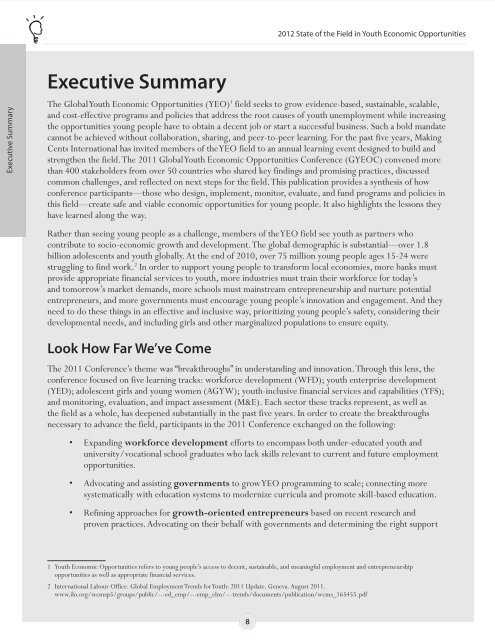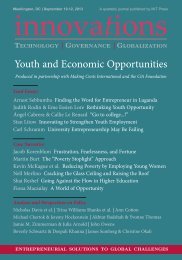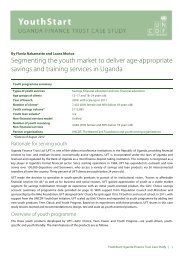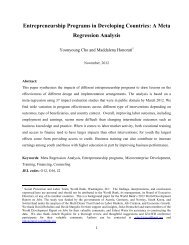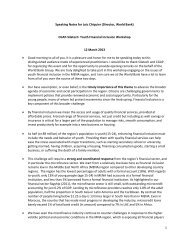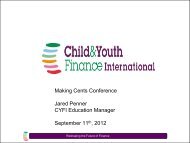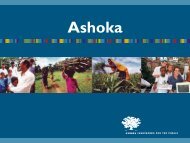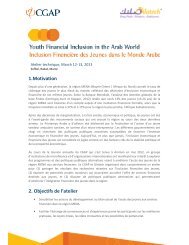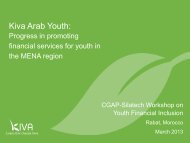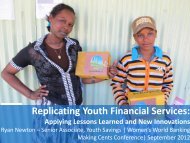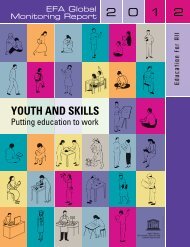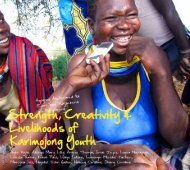STATE OF THE FIELD IN YOUTH ECONOMIC OPPORTUNITIES
STATE OF THE FIELD IN YOUTH ECONOMIC OPPORTUNITIES
STATE OF THE FIELD IN YOUTH ECONOMIC OPPORTUNITIES
You also want an ePaper? Increase the reach of your titles
YUMPU automatically turns print PDFs into web optimized ePapers that Google loves.
Table of Contents<br />
Chapter 1 Chapter 2 Chapter 3 Chapter 4 Chapter 5 Chapter 6 Chapter 7 Chapter 8<br />
Chapter 9<br />
Chapter 10 Chapter 11 Chapter 12 Chapter 13 Chapter 14 Chapter 15 Annexes<br />
2012 State of the Field in Youth Economic Opportunities<br />
Executive Summary<br />
Executive Summary<br />
The Global Youth Economic Opportunities (YEO) 1 field seeks to grow evidence-based, sustainable, scalable,<br />
and cost-effective programs and policies that address the root causes of youth unemployment while increasing<br />
the opportunities young people have to obtain a decent job or start a successful business. Such a bold mandate<br />
cannot be achieved without collaboration, sharing, and peer-to-peer learning. For the past five years, Making<br />
Cents International has invited members of the YEO field to an annual learning event designed to build and<br />
strengthen the field. The 2011 Global Youth Economic Opportunities Conference (GYEOC) convened more<br />
than 400 stakeholders from over 50 countries who shared key findings and promising practices, discussed<br />
common challenges, and reflected on next steps for the field. This publication provides a synthesis of how<br />
conference participants—those who design, implement, monitor, evaluate, and fund programs and policies in<br />
this field—create safe and viable economic opportunities for young people. It also highlights the lessons they<br />
have learned along the way.<br />
Rather than seeing young people as a challenge, members of the YEO field see youth as partners who<br />
contribute to socio-economic growth and development. The global demographic is substantial—over 1.8<br />
billion adolescents and youth globally. At the end of 2010, over 75 million young people ages 15-24 were<br />
struggling to find work. 2 In order to support young people to transform local economies, more banks must<br />
provide appropriate financial services to youth, more industries must train their workforce for today’s<br />
and tomorrow’s market demands, more schools must mainstream entrepreneurship and nurture potential<br />
entrepreneurs, and more governments must encourage young people’s innovation and engagement. And they<br />
need to do these things in an effective and inclusive way, prioritizing young people’s safety, considering their<br />
developmental needs, and including girls and other marginalized populations to ensure equity.<br />
Look How Far We’ve Come<br />
The 2011 Conference’s theme was “breakthroughs” in understanding and innovation. Through this lens, the<br />
conference focused on five learning tracks: workforce development (WFD); youth enterprise development<br />
(YED); adolescent girls and young women (AGYW); youth-inclusive financial services and capabilities (YFS);<br />
and monitoring, evaluation, and impact assessment (M&E). Each sector these tracks represent, as well as<br />
the field as a whole, has deepened substantially in the past five years. In order to create the breakthroughs<br />
necessary to advance the field, participants in the 2011 Conference exchanged on the following:<br />
• Expanding workforce development efforts to encompass both under-educated youth and<br />
university/vocational school graduates who lack skills relevant to current and future employment<br />
opportunities.<br />
• Advocating and assisting governments to grow YEO programming to scale; connecting more<br />
systematically with education systems to modernize curricula and promote skill-based education.<br />
• Refining approaches for growth-oriented entrepreneurs based on recent research and<br />
proven practices. Advocating on their behalf with governments and determining the right support<br />
1 Youth Economic Opportunities refers to young people’s access to decent, sustainable, and meaningful employment and entrepreneurship<br />
opportunities as well as appropriate financial services.<br />
2 International Labour Office. Global Employment Trends for Youth: 2011 Update. Geneva. August 2011.<br />
www.ilo.org/wcmsp5/groups/public/---ed_emp/---emp_elm/---trends/documents/publication/wcms_165455.pdf<br />
8


